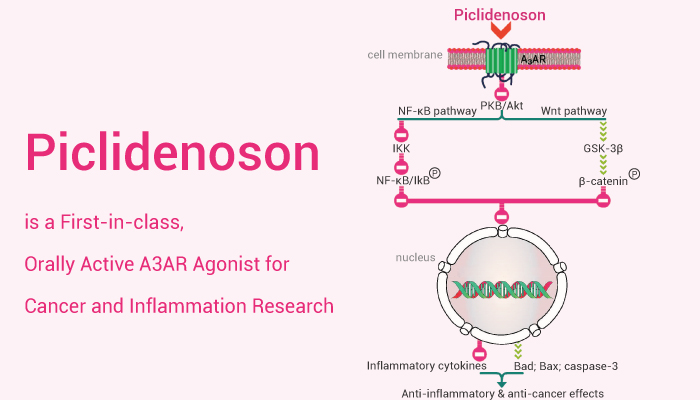Adenosine receptors (ARs) comprise a group of G protein-coupled receptors (GPCR) which mediate the physiological actions of adenosine. To date, there are four known types of adenosine receptors in humans: A1, A2A, A2B and A3. Among them, A3 adenosine receptor (A3AR) is a G protein-coupled receptors that couple to Gi/Gq and are involved in a variety of intracellular signaling pathways and physiological functions. Furthermore, A3AR mediates anti-inflammatory effects upon activation by selective agonists. A3AR is highly expressed in inflammatory tissues and peripheral blood mononuclear cells (PBMC) in Crohn’s disease, psoriasis, and rheumatoid arthritis (RA). Moreover, the inflammatory cytokine TNF-α regulates A3AR via an autocrine pathway while an increase in this cytokine expression results in a subsequent increase in NF-κB and receptor upregulation.
Also, A3AR expression level in normal cells is low, while it is more highly expressed in various tumor cells. The A3AR agonist can induce apoptosis, necrosis, or cell cycle arrest in cancer cell lines.
Piclidenoson (also known as IB-MECA or CF-101) is a selective and orally active A3 adenosine receptor (A3AR) agonist.
Piclidenoson has anti-inflammatory effects mediated by downregulation of the NF-κB signaling pathway, thereby inhibiting TNF-α. In addition, Piclidenoson inhibits Keratinocytes proliferation via the deregulation of the NF-κB signal transduction pathway resulting in a decrease in the expression levels of IL-17 and IL-23. Importantly, Piclidenoson exhibits antiproliferative effect and induces apoptosis in different cancer cell types like melanoma, colon, breast, leukemia, and prostate. For example, Piclidenoson suppresses cell proliferation via cell cycle arrest and induces apoptosis in human prostate cancer cell lines. Moreover, Piclidenoson increases sub-G1 population, activates caspase-3, and downregulates Bcl-2 expression. Besides, Piclidenoson induces apoptosis via the mitochondrial signaling pathway.
In summary, Piclidenoson is a selective and orally active A3AR agonist, has the potential for autoimmune inflammatory diseases and cancer research.
References:
[1] Hamideh Abedi, et al. Tumour Biol. 2014 Nov;35(11):11027-39.
[2] Shira Cohen, et al. J Immunol Res. 2018 May 15:2018:2310970.
